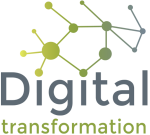
Interview
Helga Becker-Rediger
Office Manager
OMNI Dienstleistungen GmbH & Co.KG

We establish initial contacts with potential customers on behalf of our clients and in keeping with their corporate identity. Our goal is to facilitate a face-to-face visit. We differ from a call center in that our employees are assigned their own clients. This repeated contact between client and employee (as a general rule) creates a helpful feeling of familiarity and enables clear, effective communication. We are, in effect, an outsourced back-office for our customers.
When did you start the process of digital transformation in your company?
This has actually always been part of our company. As early as fifteen years ago we started this process when we switched from documenting customer information and the results of telephone conversations on index cards to a self-created database (with dbase).
For what reasons did you decide to introduce a process of digital transformation?
The introduction of the database was necessary because the time required for each monthly report […] for our clients was so high, we would have had to hire 2 new employees to sustain this. […]
Our business is heavily dependent on telephone technology. […] Today we use VoIP and use this software to initiate calls. It can also automatically recognise who is calling us and document the contents of our conversations while we are on the phone, or, where we have been given permission, we even edit these conversations. […]
Did you face problems during the implementation of the digital transformation? How did you handle these?
You refer to this as digital transformation, but we experience it as a permanent change and adaptation to technology, which has a constant impact on our business and on our customer expectations. In the beginning, our employees were the ones who required support in the face of an ever-increasing workload. Today, it is the expectations of our customers that lead to changes in our work.
Everyone who works here knows that we have to go through these changes and facilitate them if we want to keep our jobs. In that regard, we are very lucky that we can talk openly about such topics within the company, and that our company’s advice and knowledge is in demand.
Which new technologies and tools are you using and why did you choose these?
As I said before, our business is heavily driven by technology.
Today, we have a virtual telephone system (over the internet) and an internet-based CRM system. We only exchange documents electronically. […] Our internal documentation and archives are in the cloud, so we can access them even when we’re out of the office. For our tax accountant, the documents are scanned directly into DATEV and even the bank statements we get are made available electronically. Our tax consultant also gets the documentation necessary for accounting directly from the bank.
Were you confronted with sceptical employees during the implementation? Which level of the business did this resistance come from?
I mentioned earlier that we speak very openly about everything in the company. Until now, the employees have helped us at every stage and have been very committed when things haven’t gone quite as smoothly as we would have liked.
What did you want to achieve by implementing this process of digital transformation? What are your future plans?
We want our company to survive in the market and our customers to enjoy working with us. To achieve this, we must offer the right added value to our customers. […]
What advice do you have for an organisation that is just starting or wants to start a process of digital transformation?
I think we are very fortunate to have such a high level of transparency in our company in regard to its development, meaning that everyone can contribute their part and are directly involved in our company’s improvement and success. Get started, don’t wait around for a long time making plans. Your success will prove you right in the end, even if you make a mistake or suffer a setback.
What risks have you identified that have not yet been solved through the process of digitalisation?
[…] The biggest risk for me is simply to blindly submit to technological change, because this puts people into the background. I am firmly convinced, however, that our company proves that man is in charge and not technology.

